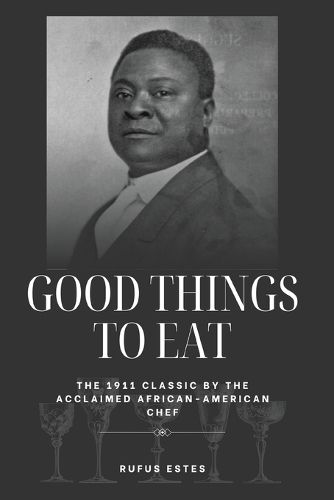Readings Newsletter
Become a Readings Member to make your shopping experience even easier.
Sign in or sign up for free!
You’re not far away from qualifying for FREE standard shipping within Australia
You’ve qualified for FREE standard shipping within Australia
The cart is loading…






This title is printed to order. This book may have been self-published. If so, we cannot guarantee the quality of the content. In the main most books will have gone through the editing process however some may not. We therefore suggest that you be aware of this before ordering this book. If in doubt check either the author or publisher’s details as we are unable to accept any returns unless they are faulty. Please contact us if you have any questions.
Good Things to Eat: A Historic Culinary Journey from a Pioneering African-American Chef
Rufus Estes (1857-c. 1939) was an African-American chef whose remarkable life took him from enslavement in Tennessee to prominence as a private chef for wealthy industrialists and executives, including service aboard luxury Pullman railroad cars. After gaining his freedom following the Civil War, Estes honed his culinary skills through years of experience in some of the most refined kitchens of his time. His career embodied both personal triumph and broader social change, reflecting the opportunities and challenges faced by African Americans in the post-Reconstruction era. Good Things to Eat, his cookbook published in 1911, remains a rare and important document, preserving a record of Black culinary excellence at the turn of the 20th century.
Good Things to Eat is a rich collection of over 600 recipes, showcasing the breadth of American and international cuisine as practiced by an accomplished chef. From elegant entrees to hearty comfort foods, Estes offers practical instructions and personal touches that reflect his professional expertise and deep love of cooking. More than just a recipe book, it serves as a historical testament to African-American achievement in the culinary arts, offering modern readers a glimpse into the dining culture of the Gilded Age and early 20th century. With its charming language and enduring recipes, the book remains a valuable resource for historians, chefs, and anyone interested in the rich tapestry of American food traditions.
$9.00 standard shipping within Australia
FREE standard shipping within Australia for orders over $100.00
Express & International shipping calculated at checkout
This title is printed to order. This book may have been self-published. If so, we cannot guarantee the quality of the content. In the main most books will have gone through the editing process however some may not. We therefore suggest that you be aware of this before ordering this book. If in doubt check either the author or publisher’s details as we are unable to accept any returns unless they are faulty. Please contact us if you have any questions.
Good Things to Eat: A Historic Culinary Journey from a Pioneering African-American Chef
Rufus Estes (1857-c. 1939) was an African-American chef whose remarkable life took him from enslavement in Tennessee to prominence as a private chef for wealthy industrialists and executives, including service aboard luxury Pullman railroad cars. After gaining his freedom following the Civil War, Estes honed his culinary skills through years of experience in some of the most refined kitchens of his time. His career embodied both personal triumph and broader social change, reflecting the opportunities and challenges faced by African Americans in the post-Reconstruction era. Good Things to Eat, his cookbook published in 1911, remains a rare and important document, preserving a record of Black culinary excellence at the turn of the 20th century.
Good Things to Eat is a rich collection of over 600 recipes, showcasing the breadth of American and international cuisine as practiced by an accomplished chef. From elegant entrees to hearty comfort foods, Estes offers practical instructions and personal touches that reflect his professional expertise and deep love of cooking. More than just a recipe book, it serves as a historical testament to African-American achievement in the culinary arts, offering modern readers a glimpse into the dining culture of the Gilded Age and early 20th century. With its charming language and enduring recipes, the book remains a valuable resource for historians, chefs, and anyone interested in the rich tapestry of American food traditions.